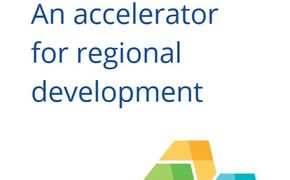On 10 February 2022, the Interreg Europe Policy Learning Platform held an online webinar on ‘Collection and Recycling of Waste from Electrical and Electronic Equipment (WEEE)’.
At 2% annual growth rate, electrical and electronic equipment waste (WEEE) is among the fastest growing waste streams, having climbed to 12 million tons in 2020 according to estimates. This waste stream comprises of a complex mixture of materials, including hazardous content, requiring specific management to avoid major environmental and health damage, or high value and critical raw materials. For example, around 10% of gold worldwide is used to produce modern electronics. Collection rates in Europe are still very low, below 40%. Some expert studies are estimating the number is actually around 23%. When collected, the recycling rates reach around 80%.
Discarding WEEE materials also translates to significant financial losses for the European economy. It is estimated that the overall potential revenues from WEEE recycling in the EU could amount to € 2.15–3.67 billion (2020). To improve reuse and recycling of WEEE, the European Union has set a target of a 65% minimum collection rate (EU WEEE Directive) and presented ideas of EU-wide take back/sell back schemes or a review of hazardous substances used in electronic equipment in the Circular Economy Action Plan. Moreover, the Eco-design Directive calls for better reparability and durability of electronic items.
The webinar presented policy measures and circular approaches from Interreg projects CIRCE, 2Lifes and GPP4GROWTH to improve the collection and recycling of WEEE in line with the European agenda, aiming to inspire local and regional authorities.
Webinar recording
Agenda overview
Moderation and concept by Astrid Severin and Magda Michalikova, thematic experts for environment and resource efficiency.
00:01:08 Introductory presentation to the topic and about the programme by Astrid Severin
00:10:30 Presentation by Timmy de Vos on the E-waste Race
00:25:20 Q&A: Is the collection of other electronic equipment also included?
00:27:20 Q&A: How is the collected waste recycled?
00:28:45 Presentation by Tihomir Bakalov on the organization 'Eltechresource JSC'
00:41:25 Q&A: What is the next step for retailers regarding the recycling process?
00:45:50 Q&A: What is done with the recycled materials?
00:47:00 Presentation by Oscar Planells on preparation for re-use of WEEE
00:57:05 Q&A: What should waste experts do to reinforce the European directives in the direction of requiring more repair of e-waste?
01:01:09 Q&A: Are there any restrictions for independent repairs?
01:08:10 Presentation by Vasileios Kokkinos on Green Public Procurement criteria in the procurement of waste transport and management services for WEEE
Panel discussion
01:19:10 Q&A: How could a deposit fee return system on electronics influence the collection and recycling of WEEE?
01:24:15 Q&A: What specific actions can be taken for harmonization of WEEE collection
01:27:30 Q&A: What are recommendations to increase the repair & recycling of WEEE
Key learnings
The webinar opened with a presentation by Timmy de Vos from Race Against Waste. Research shows that children have a major influence over their parents’ sustainability decisions. That is why education is at the core of a wider change. E-waste Race organises a competition among schools, where children get points for collecting and repairing small electrical devices and for campaigning on the topic in their neighbourhoods. The initiative has collected and sent out for recycling more than two million devices since 2014, with an average of 14,000 kg per race.
- Watch a short video about Race Against Waste!
- See examples of circular electronic products – Fairphone, Gerrard Street headphones
The example from Bulgaria, presented by Tihomir Bakalov, provides some important learnings on how to reach a 65% WEEE collection rate. The ELTECH Resources company together with the municipality of Sofia have introduced a free of charge electronic waste collection at people’s homes. Citizens thus have daily collection of electronic waste available to order via telephone. The service was supported by an awareness raising campaign, as well as discount coupons available to those who brought their WEEE for recycling.
WEEE re-use is more environmentally friendly than recycling, saving 1.14 tonnes of CO2 per tonne compared to 0.85 tonnes and has a significant job creation potential. Preparation for the re-use of WEEE creates between 60 and 140 jobs per 1,000 tons. Oscar Planells (RREUSE) shared several recommendations for better electronic waste management: introduction of eco-design policies, durability and repairability scores on products, tax exemptions and economic incentives to support re-use, circular skills programmes, and guarantees for repaired items.
Examples of good practices from Interreg Europe project 2Lifes shared by Oscar:
- Job creation in the re-use sector: data insights from social enterprises.
- Collection of home appliances in Asturias
- Reuse of computers for students
- Macerata Trashware: recovery of obsolete computers
Green public procurement can play an important role in waste management. The procurement objectives of Malta’s WEEE collection were based on the results of a LCA study and aimed to ensure sustainable management of WEEE, reduce emissions related to waste collection and to improve environmental performance of the whole WEEE value chain. The inclusion of green criteria in tenders has led to reduced transport emissions, more effective recycling, and increased collection. Moreover, a strong signal was sent to future potential contractors.
Key learnings as shared by the speakers are the following:
- Public authorities should provide a “green” waste collection services, adopt a centralised approach and always consider the full life cycle
- Decrease in consumption is needed, electronic products need to last longer
- Separate targets for re-use must be introduced (otherwise recycling is incentivised over re-use)
- Focus on eco-design, recyclability and durability
- Municipalities should share available resources and make them accessible, and collaborate with local social enterprises and initiatives
- Education and awareness raising are crucial for behaviour change.









